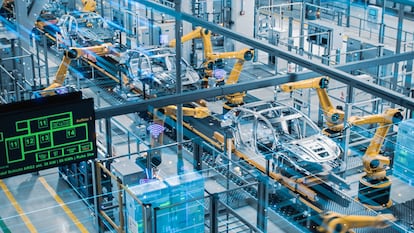Artificial intelligence fever ignites a Wall Street frenzy
While investors pursue AI stocks, it’s too early to tell who has lasting power

Financial markets can be very welcoming to technologies that promise to change the world, but history is riddled with episodes of irrational exuberance. Investors were right about the internet but mistakenly rushed in to buy any technology stock associated with the nascent world wide web. The dotcom boom was the first bubble to burst in the 21st century.
Few doubt electric cars will dominate the roads before too long, but manufacturers like Lucid, Nikola and Rivian have had a forgettable year. These companies have failed to turn a profit and have struggled to catch up to Tesla, which can afford a protracted price war. They also face challenges from the rest of the deep-pocketed automotive industry, which wants a share of the electric-vehicle pie.
The two magic words these days are artificial intelligence (AI). Wall Street’s eyes show dollar signs for any company that dabbles in AI – it doesn’t even have to be a core business to trigger a stock price jump. News portal BuzzFeed provided the most surprising episode when it announced in late January that it would use OpenAI’s ChatGPT system to improve its surveys and produce some content, tasks currently performed by human employees. All hell broke loose, and the company’s downtrodden share price quadrupled in two days.
The euphoria soon cooled, and BuzzFeed lost half its market capitalization. It still trades at almost twice the price before its AI announcement, despite no indication that the move will substantially improve its finances. Comcast, a major BuzzFeed shareholder, didn’t see it as a panacea and took advantage of the price spike to sell shares and reduce its stake in the company from 24% to 15.5%. The selloff lost money for Comcast, which had bought BuzzFeed shares in 2015 and 2016 at much higher prices. Comcast’s willingness to take the loss shows that it’s not optimistic about recovering its investment despite the potential benefit of using ChatGPT.
While the BuzzFeed episode was the most conspicuous case of AI speculation, it has not been the only one. California-based Soundhound AI, specializing in voice recognition and natural language processing solutions, has watched its market capitalization rise by 150% in 2023 to almost $700 million.
The company’s website touts its restaurant solution: “SoundHound’s voice assistant answers every call – even during peak hours – eliminating the busy signal, taking multiple orders simultaneously, and seamlessly processing the order and payment through your POS system.” It also offers solutions for customer service centers, hotel guest services, and a voice assistant for your vehicle. The website example says: “Find me a Mexican restaurant on my route home that has at least 4 stars, accepts take-out orders and isn’t a taquería.”
California-based C3.ai is also off to a flying start this year. It’s a more established software provider that partners with Microsoft, Alphabet and Amazon in several industries. According to CEO Tom Siebel, its tools enable banks to spend less time on loan applications, prevent power grid failures, and optimize airline fleet utilization. “The software can use telemetry data connected to aircraft sensors to perform predictive maintenance and increase aircraft availability by 50%,” says Sibel. The company’s share price has risen 148% since January 1 to a market capitalization of $3 billion.
Ripple effect
Due to widespread media coverage and mega-deals like Microsoft’s $10 billion investment in OpenAI, it’s hard to find any company in the sector that is doing poorly. BigBear AI, based in Maryland (USA), is up 335% on the stock market this year. The AI software company’s clients include the US Army, medical centers and manufacturing companies that need help managing their supply chains.
The ripple effect goes beyond pure AI players. US-based Nvidia, one of the world’s largest chipmakers and a major supplier of AI processors, is also doing very well. In a recent investor conference, Nvidia CEO Jensen Huang said that the use of its chips to power artificial intelligence services such as chatbots has soared in the last two months. Nvidia stock is up 65% in 2023 and now has a market capitalization of $578 billion. Rival semiconductor maker Intel, on the other hand, is lagging far behind in getting into the AI chip market. Intel’s stock price has dropped by 3% on the Nasdaq index this year, leading the company to announce a dividend cut.
Even though Microsoft and Google are on center court battling for artificial intelligence dominance, their share prices haven’t been affected much by the AI frenzy. Size and diversification have insulated them from volatility, and the giant companies have many other revenue sources, such as cloud computing, PC software, advertising and search engine businesses. But they are not entirely shielded from AI-related impacts. Google paid dearly for the hasty launch of its Bard chatbot, which aims to challenge Microsoft’s ChatGPT. Bard’s answer was wrong when asked in the live demonstration on February 8 about the James Webb Space Telescope’s latest discoveries. Parent company Alphabet’s share price plummeted 7%, annihilating $100 billion in market value.
Investor capital is impatiently searching for the frontrunners in the artificial intelligence revolution, many of which may not even exist yet. Some current contenders will inevitably crash and burn. Those who find the needle-in-a-haystack winner will probably multiply their investments many times over, just like a small online bookstore called Amazon once did.
Sign up for our weekly newsletter to get more English-language news coverage from EL PAÍS USA Edition
Tu suscripción se está usando en otro dispositivo
¿Quieres añadir otro usuario a tu suscripción?
Si continúas leyendo en este dispositivo, no se podrá leer en el otro.
FlechaTu suscripción se está usando en otro dispositivo y solo puedes acceder a EL PAÍS desde un dispositivo a la vez.
Si quieres compartir tu cuenta, cambia tu suscripción a la modalidad Premium, así podrás añadir otro usuario. Cada uno accederá con su propia cuenta de email, lo que os permitirá personalizar vuestra experiencia en EL PAÍS.
¿Tienes una suscripción de empresa? Accede aquí para contratar más cuentas.
En el caso de no saber quién está usando tu cuenta, te recomendamos cambiar tu contraseña aquí.
Si decides continuar compartiendo tu cuenta, este mensaje se mostrará en tu dispositivo y en el de la otra persona que está usando tu cuenta de forma indefinida, afectando a tu experiencia de lectura. Puedes consultar aquí los términos y condiciones de la suscripción digital.









































